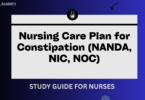Ovarian cancer is a major health concern, ranking as the fifth leading cause of cancer deaths in women in the US. It affects nearly 22,000 women yearly. This highlights the need for detailed nursing care to help patients through their treatment and recovery.
This article offers a complete nursing care plan for ovarian cancer patients. It covers understanding the disease, pre and post-surgery care, managing treatment side effects, and providing psychosocial and nutritional support. Our aim is to help nurses give the best care possible to ovarian cancer patients.
Key Takeaways
- Ovarian cancer is a leading cause of cancer-related deaths among women in the US
- Comprehensive nursing care is crucial for supporting ovarian cancer patients
- This article covers essential aspects of nursing care, including disease understanding, preoperative and postoperative interventions, and managing side effects
- Nurses play a vital role in delivering optimal care and support for ovarian cancer patients
- Psychosocial and nutritional support are important components of the nursing care plan
Understanding Ovarian Cancer
Ovarian cancer is a complex disease with different types and stages. Each stage and type affects a patient’s treatment and outlook. Healthcare professionals can offer better care by understanding these details.
Types and Stages of Ovarian Cancer
Ovarian cancer has several types, each with its own treatment plan. The main types are epithelial, germ cell, and stromal tumors. They vary in where they start, how they grow, and how they react to treatment.
The cancer is also staged to show how far it has spread. Stages range from early (I-II) to advanced (III-IV). Knowing the stage helps doctors choose the right treatment and predict the outcome.
Risk Factors and Early Detection
Some things can make a person more likely to get ovarian cancer. These include family history, genes, and past health. While some risks can’t be changed, others can be lowered by lifestyle changes and screenings.
Finding ovarian cancer early is key to a better chance of treatment success and survival. Tests like pelvic exams, imaging, and biomarkers help spot it early.
Healthcare pros can give better care by understanding ovarian cancer well. More research and new treatments are needed to help ovarian cancer patients live better lives.
Nursing Care Plan for Ovarian Cancer
Caring for ovarian cancer patients needs a detailed nursing care plan. Nurses are key in giving care that focuses on the whole patient. They work on important assessments, interventions, and goals. This helps ovarian cancer patients and their families.
The nursing care plan for ovarian cancer includes several key parts:
- Comprehensive Assessment: Nurses check the patient’s physical, emotional, and mental health. They watch for symptoms, pain, and how well the patient functions.
- Symptom Management: Nurses create plans to help with symptoms like belly pain, nausea, tiredness, and changes in bowel or bladder.
- Medication Administration: Nurses make sure patients get their medicines on time, including treatments, pain relievers, and other supportive drugs.
- Patient Education: Nurses teach patients and their families about the disease, treatment, and how to take care of themselves. This helps patients take part in their care.
- Psychosocial Support: Nurses help with the emotional and mental effects of ovarian cancer. They offer counseling, support groups, and mental health referrals when needed.
- Coordination of Care: Nurses work with the healthcare team to make sure care moves smoothly between different places and keeps going well.
A good nursing care plan helps ovarian cancer patients manage their condition better. It improves their life quality and helps them get the best results possible.
| Nursing Goals for Ovarian Cancer Patients | Nursing Interventions |
|
|
Preoperative Care and Patient Education
Getting ovarian cancer patients ready for surgery is key to their treatment. Preoperative care and education are crucial for the best outcomes and a smooth surgery experience.
Preparing for Surgery
Patients will go through a detailed preoperative check-up before surgery. This includes looking over their medical history, a physical check-up, and any tests needed. They’ll get clear instructions on how to prepare, like what foods to avoid, changes to their meds, and any steps to take before surgery.
Patients will also learn a lot about the surgery, risks, and recovery. This covers the surgery itself, managing pain, and taking care of themselves after surgery.
Psychological Support
Surgery can be very stressful and scary for ovarian cancer patients. To help, healthcare teams offer psychological support and resources. This helps patients deal with the emotional and mental parts of their treatment.
- Counseling and therapy to manage anxiety, depression, and other mental health issues
- Materials on stress management, like relaxing exercises and mindfulness
- Help with finding support groups and community resources
By giving thorough preoperative care and education, healthcare teams help ovarian cancer patients feel ready and informed about their surgery. This can make the surgery go better and improve the treatment experience overall.
Postoperative Nursing Care
After ovarian cancer surgery, it’s key to have a detailed plan for postoperative care. This plan includes managing pain and taking good care of the wound. These steps are crucial for a smooth recovery and to avoid complications.
Pain Management
Managing pain well is a main focus in caring for ovarian cancer patients after surgery. Nurses work with the healthcare team to create a pain plan that fits the patient’s needs. This plan might use medicines like opioids and NSAIDs, or non-medical methods like TENS and guided imagery.
Wound Care
Keeping the surgical site clean and free from infection is vital for ovarian cancer patients. Nurses check the wound often, look for signs of infection, and change dressings as needed. Sometimes, special dressings or products like hydrogels are used to help healing.
By focusing on pain management and wound care, nurses are key to helping ovarian cancer patients recover well after surgery. This complete care approach is important for improving the patient’s life quality and leading to a good outcome.
Chemotherapy and Radiation Therapy
Ovarian cancer patients often get both chemotherapy and radiation therapy. These treatments need special nursing care. Nurses help manage the side effects and challenges patients face.
Chemotherapy for Ovarian Cancer
Chemotherapy is a key treatment for ovarian cancer. It can be given through an IV or by mouth. Nurses watch over patients to see how they react to the treatment.
They handle side effects and keep patients safe. Nurses teach patients and their families about the treatment.
Radiation Therapy for Ovarian Cancer
Radiation therapy targets cancer in specific body areas. Nurses work with the radiation team to plan treatments and watch for side effects. They give support to patients during this treatment.
Nurses know how to deal with side effects of chemotherapy and radiation therapy. These include nausea, tiredness, and skin problems. Teaching patients how to take care of themselves helps improve their quality of life during treatment.
Supportive Care Measures
- Antiemetic medication administration to manage nausea and vomiting
- Hydration and electrolyte monitoring to prevent dehydration
- Skin care interventions to address radiation-induced dermatitis
- Energy conservation techniques to mitigate fatigue
- Emotional support and counseling to address the psychological impact of treatment
With these special nursing steps, teams help ovarian cancer patients with chemotherapy and radiation therapy. This support improves their well-being and treatment results.
Managing Side Effects
Ovarian cancer treatment can be tough, leading to side effects that affect a patient’s life quality. Nurses must know and manage these side effects to keep patients comfortable and well. We’ll look at nausea and vomiting, and fatigue and anemia. We’ll talk about how to lessen their effects.
Nausea and Vomiting
Many ovarian cancer patients feel nauseous and vomit, especially during chemotherapy. Nurses should work with patients to find out what triggers these symptoms. Then, they can make a care plan. This might include anti-nausea drugs, staying hydrated, and eating small, frequent meals to avoid making symptoms worse.
Fatigue and Anemia
Patients with ovarian cancer often feel tired and may have anemia. This can come from the disease or treatment side effects. Nurses can help by encouraging exercise, making sure patients rest enough, and checking for anemia signs like pale skin or shortness of breath. Sometimes, iron supplements or blood transfusions are needed to treat anemia.
| Symptom | Nursing Interventions |
| Nausea and Vomiting |
|
| Fatigue and Anemia |
|
Nurses can greatly improve ovarian cancer patients’ lives by tackling these common side effects early. This helps patients during their treatment.
Palliative and End-of-Life Care
When ovarian cancer gets worse, care shifts to palliative care and end-of-life care. These types of care focus on making patients and their families comfortable. They also help manage symptoms and offer emotional support during tough times.
Palliative care for ovarian cancer patients uses a team approach. It looks at the patient’s physical, emotional, social, and spiritual needs. Nurses are key in this, working with the patient, their family, and other healthcare professionals. They make sure the patient stays comfortable and lives well.
At the end-of-life stage of ovarian cancer, nurses give full supportive care. This means:
- Managing pain and other symptoms that cause discomfort
- Offering emotional support and counseling
- Helping with advance care planning and making decisions
- Setting up hospice or palliative care services
- Supporting the patient’s family and caregivers
Nurses focus on the whole person to ensure ovarian cancer patients get the caring, tailored care they need. This is during a very hard time.
Nutritional Support
Proper nutrition is key for ovarian cancer patients. It helps with their health, healing, and reduces side effects from treatment. By knowing the importance of nutrition, patients can improve their diet and quality of life.
Diet Recommendations
A balanced diet is vital for ovarian cancer patients. Experts suggest the following:
- Eat a variety of fruits and vegetables for vitamins, minerals, and antioxidants.
- Choose whole grains like brown rice, quinoa, and whole-wheat bread for complex carbs and fiber.
- Add lean proteins such as chicken, fish, and legumes to support healing and muscle health.
- Drink lots of water and limit sugary drinks to stay hydrated.
- Avoid processed, high-fat, and high-sugar foods to reduce inflammation and health risks.
Supplementation
Some ovarian cancer patients might need supplements for extra nutrition. These supplements can help with specific needs or overall health. Common supplements include:
| Supplement | Potential Benefits |
| Multivitamin | Gives essential vitamins and minerals for overall health. |
| Omega-3 fatty acids | May lessen inflammation and boost immune function. |
| Probiotics | Helps keep the gut healthy and supports digestion. |
| Vitamin D | Crucial for bone health and may fight cancer. |
Before starting any supplements, ovarian cancer patients should talk to their healthcare team. Supplements can affect medications or have other concerns for each person.
Psychosocial and Emotional Support
Ovarian cancer is a tough diagnosis that can really affect a person’s emotions. Nurses need to care for both the body and the mind of these patients. By offering full support, nurses can help patients deal with their cancer journey and make their life better.
Offering psychosocial support is key for ovarian cancer patients. This means connecting them with support groups, counseling, or other resources. Nurses should also listen to patients and let them share their feelings and worries.
Emotional support is also vital for these patients. Nurses can help with anxiety, depression, and other feelings through things like relaxation techniques and mindfulness. This helps patients feel better and more resilient during their cancer treatment.
The care for ovarian cancer patients must cover both their body and feelings. Nurses can make a big difference by supporting patients fully. This helps patients handle their diagnosis better and improves their life quality during treatment and recovery.
Conclusion
This article has given a detailed nursing care plan for ovarian cancer patients. It covers understanding the disease, preoperative and postoperative care, managing side effects, and holistic support. Nurses are key in delivering optimal care and improving the well-being of ovarian cancer patients.
The key takeaways for ovarian cancer nursing highlight the need for early detection and thorough preoperative prep. Effective pain management and a team approach are also crucial. Nurses must watch for complications, manage side effects, and offer support to improve life quality for ovarian cancer patients.
This comprehensive nursing care plan for ovarian cancer offers a holistic, evidence-based approach. It empowers nurses to make a big difference in patients’ lives. By staying informed, advocating for patients, and working with the healthcare team, nurses are vital in summary of ovarian cancer nursing care. They help improve patient outcomes.
FAQ
What are the different types and stages of ovarian cancer?
Ovarian cancer comes in several types, like epithelial ovarian cancer and germ cell tumors. It also has stages from I to IV. The stage shows how far the cancer has spread.
What are the risk factors for developing ovarian cancer?
Being at risk for ovarian cancer can depend on family history, genetic mutations, age, weight, and infertility or endometriosis history. Finding it early can make a big difference.
What are the essential components of the nursing care plan for ovarian cancer patients?
The care plan for ovarian cancer patients includes many things. Nurses do thorough checks, help before and after surgery, manage side effects, and offer support. They also focus on nutrition and care at the end of life.
How do nurses prepare ovarian cancer patients for surgery?
Nurses are key in getting patients ready for surgery. They educate patients, help with emotional issues, and make sure they’re ready in all ways for the surgery.
What are the key considerations for postoperative nursing care in ovarian cancer patients?
After surgery, nurses focus on controlling pain, caring for wounds, watching for problems, and helping patients recover well.
How do nurses support ovarian cancer patients undergoing chemotherapy and radiation therapy?
Nurses help patients with chemotherapy and radiation by managing side effects like nausea and fatigue. They support patients through their treatment.
What nutritional considerations are important for ovarian cancer patients?
Good nutrition is key for ovarian cancer patients. Nurses guide them on what to eat, fix nutritional gaps, and suggest supplements. This helps with healing.
How do nurses address the psychosocial and emotional needs of ovarian cancer patients?
Nurses help ovarian cancer patients with their feelings and social needs. They offer counseling, connect patients with help, and create a caring space during their cancer journey.










